Malcolm R. Campbell's Blog, page 186
November 15, 2016
“Do I feel lucky? Well, do ya, spammers?”
As many of you know, I take a dim view of spammers because they show up and do their business here without taking part in the conversation or sharing my posts on Twitter or Facebook. Just imagine yourself having a dinner table conversation with your family about the best books you’ve ever read when somebody you don’t know walks into your house, sits down at the table, eats a plate full of mashed potatoes and gravy, and says, “So, y’all want a way to get some cheap condoms?”
That’s a spammer for you.

Spin the wheel of fortune when you leave spam on my posts – Wikipedia Photo
I appreciate the fact that WordPress weeds out most of the people who try to stop by our blogs to steal all the gravy. But, there’s more work to be done.
With that in mind, I’ve installed my Anti-Spammer Hex App that tracks down those who show up on this blog and on my “Sun Singer’s Travels” blog and try to sell us stuff that has nothing to do with my posts–and worse yet–don’t pay for advertising on my site.
While working on Conjure Woman’s Cat and Eulalie and Washerwoman, I took a lot of notes about spells, magic, candles, plants and especially protection hexes. If you ever hired a hoodoo practitioner, you might have been handed a mojo bag filled with the ingredients of the “law keep away” spell. (It does just what you think it does.)
Well, I’ve modified the “law keep away” spell with extra graveyard dirt obtained from cemeteries that cater to sociopaths and have merged that into the traditional mix while burning a black candle during the new moon as a squinch owl shouted curses from a longleaf pine tree. The resulting formula has undergone rigorous testing at a town near you or maybe even in your neighborhood. If there have been any recent outbreaks of green apple quick step, lice, or mysteriously appearing vulgar tattoos, a spammer or two just wasn’t lucky.
The luck comes into the mix through a random number generator subroutine I added to my assembly language code. This gives spammers a 1 in 100 chance of getting away with leaving a free message here on my blog without being hexed. See, I can be a good sport about this even though the odds favor the house.
So, if you’ve stopped by with a spam message, just ask yourself. . .well, you know what.
Malcolm R. Campbell’s two hoodoo novels can be found at Amazon in paperback and e-book editions. The audio edition of “Conjure Woman’s Cat” received an Earphones Award Winner at AudioFile Magazine.


November 14, 2016
Now is a good time to listen to the blues
Used to be, a lot of folks sang the blues, listened to them, too, because they spoke soul to soul about the troubles they were seeing and would see again the following day and possibly always.
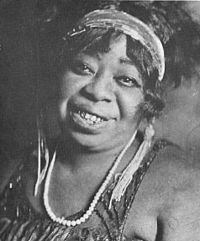
Ma Rainey
I grew up listening to the blues, they’ve always spoken to me, and even though I don’t hear them as much now as I once did, I listened to them a lot while I was writing my last two books because those books were about troubles and bearing heavy loads and making things right. I hear Ma Rainey singing in my dreams, whether it’s “See See Rider” or “Boll Weevil” and really those songs are lullabies.
The Presidential election has created a great upheaval, folks shouting and fearful, yelling at friends, becoming argumentative, thinking all is lost no matter which candidate they voted for. There’s not a lot of comfort out there when things are so polarized you have to keep silent unless you agree 100% with what an other person says.
Good people voted for both candidates, but most folks don’t see it that way. Those who like Candidate A say you’re evil if you voted for Candidate B. Those who like Candidate B say you’re evil if you like Candidate A. I think we have to keep working toward consensus on the important issues, focusing on programs rather than fiery labels, and focusing on respect rather than assuming the worst in everyone else.
I swear to goodness, people need the blues so they’ll feel somebody out there knows how they feel, whether it’s the Mother of the Blues (Ma Rainey) or one of a hundred other people who converted their feelings into music that resonated with everyone who needed a lift up or a reminder they aren’t alone.
As it is, a fair number of people have retreated into their quiet living rooms or their like-thinking groups of family and friends. Perhaps that’s a reasonable start. But it isn’t a reasonable end. “Us vs. Them” is a poor way to live. There’s no respect in it, no giving others the benefit of the doubt, no chance for agreement.
The blues make a man or a woman human rather than the shouting member of a mob or the defeated person who cannot cope or consent to live the best they can no matter what life throws at them. We need more humanness today, more time to come to terms with whatever sorrows we hold, whatever troubles we’ve seen, more compassion for those we don’t understand, and a chance to keep doing right and honorable things without expecting a gold medal for it, and a way of thinking that leads us to assume those around us are good and trustworthy without their having to wear slogan-covered tee shirts or safety pins or a shrill and self-righteous cynicism on their sleeves.
My prescription: Go to YouTube or iTunes or Amazon and find some blues and settle down for the night with nothing but the music–and possibly a Mason jar of moonshine–and let put the world on hold. Let the blues run through you like a sweet hot knife through willing warm butter. You won’t need to call me in the morning because you’ll be all right with the world–come what may.
–Malcolm


November 12, 2016
Memory Lane: Kellogg’s Krumbles
 Researching a novel set in the 1950s–during my childhood–brought me many memories as I looked at the political issues, the fads and the products. While I didn’t mention Kellogg’s Krumbles cereal in the book, seeing the familiar box again was definitely a trip down memory lane.
Researching a novel set in the 1950s–during my childhood–brought me many memories as I looked at the political issues, the fads and the products. While I didn’t mention Kellogg’s Krumbles cereal in the book, seeing the familiar box again was definitely a trip down memory lane.
Krumbles was my favorite cereal because I liked the taste and the fact that it didn’t get soggy in milk. Supposedly, Kellogg’s was trying to make a shredded wheat like product, but it ended up crumbling in the box. So, they crumbled it on purpose and it made a fine, high-fiber cereal that was on the market between the 1920s and the 1960s.
According to Murphy’s Laws, if you like a product, that’s the one the grocery store and/or the manufacturer discontinues. Losing Krumbles wasn’t a loss of innocence, it was a lost of a tasty breakfast.
–Malcolm
Malcolm R. Campbell’s 1950s novel is called “Eulalie and Washerwoman.” It’s the story of a conjure woman who uses folk magic to fight a corrupt businessman in her small Florida Panhandle town.


November 10, 2016
OMG, when bad things happen, people say it’s my fault
Recently, when my wife and I were asked where we live and we said, “Georgia,” the response of the northern lady asking the question was, “I’m so sorry.” Now, in Georgia, the word “sorry” is a synonym for being no good, but since we weren’t in Georgia at that moment, I don’t think this lady was claiming to be no good; more that we had given her bad news to the effect that (I suppose) we lived in some horrid place and she was sympathizing with us.
I told my wife later that at least she (my wife) is a woman and is therefore not part of the problem. What problem? That would be the problem of being a scapegoat. In this case, a scapegoat for about every bad thing that happens.
These days, most bad stuff is purportedly caused by angry old white men who live in (or wish they lived in) the South. I meet all these criteria except the angry thing, but when I say I’m not angry, people say I just haven’t realized it yet.
In “Margaritaville,” Some people claim that there’s a woman to blame, but everywhere else, people claim a white man’s to blame, and heaven help him if he’s also from the South, that part of the country everyone everywhere else loves to libel, mock and belittle in every possible way.
I saw my Facebook picture in the post office on the elitists’ most wanted list:
Some kid in Peoria got diarrhea on his 10th birthday party and, like many “crimes” these days, witnesses who weren’t even there told CNN that I did it with some kind of hex or chemical that caused his green apple quick step.
One of protesters blocking the 101 freeway in California said he couldn’t cope with the election results and guess who caused Hillary to lose. Even though the young man–one of those with no coping skills and spent Halloween in a safe room at college–said he “just knew” I rigged something and caused Hillary to lose.
A man in New Jersey failed to respond to a chain letter and after he met with a horrible demise, his heirs said they were “pretty damned sure” I created the chain letter and all the bad luck that followed in its wake.
Some people holding a seance in California, were told by well-meaning spirits that the reason their state is talking about a CALEXIT secession from the Union is–guess who?–me. They even marched on Sacramento and demanded that my California birth certificate be destroyed since–being old, white and in the South–I was “in all probability” the catalyst for all of the nation’s ills.
Any time one of the 800+ American hate groups monitored by the Southern Poverty Law Center says or does something abominable, I (and other old white guys) are presumed to have signed off on it even though we haven’t heard of the groups.
I don’t want to complain overly much, but being the default scapegoat for so many diverse ills is a tiring job. Sherman, who is not well liked in Georgia, once said, “I will not accept if nominated and will not serve if elected.” Hell, I wasn’t even nominated as the scapegoat; I (along with all the other old white guys) just got voted into the job by the same kind of elitist attitude that would bring a person to tell my wife and I she’s just so sorry we got stuck in Georgia.
Sure, I have an alibi for every crime on the list attributed to me, but in these interesting times, alibis don’t matter because my so-called “white privilege” (they say) allows me to rig the system and do whatever I want. That’s the assumption when I tell them I wasn’t there when they stubbed their toe on one of their cats or got drunk with hookers and got caught by their wives.
So, when it comes down to it, I can see that people’s perception of me (and my fellow white guys) is a projection they have created and that they now believe is the gospel truth. It’s hard to argue with that because folks think they’re right rather than nuts. Most of these people could be cured with Xanax or pot, but “recreational” cures are slow in becoming legal.
If you ever look at many of the things happening in the world and think the perpetrators are lunatics, you’ll know how I feel about those who blame me for for their problems. On the other hand, I know that blaming me gives many people a way to sleep at night.
–Malcolm
Malcolm R. Campbell is the author of satire, fantasy, and magical realism novels.


November 7, 2016
Writers: Pay Yourself First
“When I fell off the horse, fumbling around in the aftermath of my Bookbub haze, habit alone got me back up. I had to write again — every day. With full commitment, without judgment, I had to do it. When I realized getting back on the horse was the only way through the pain, I saddled up. I committed to getting up an hour earlier than usual, sitting down at my desk immediately upon waking, and writing a thousand words a day until I’d finished another novel. I didn’t miss a day, I didn’t change my schedule, I didn’t let anyone or anything — including myself — steal my ten percent.”
Source: Writers: Pay Yourself First – Indies Unlimited
Years ago, K. P. Ambroziak read a book that said we should pay ourselves first, 10% off the top, and save that money before it can get siphoned off by taxes, bills and other expenses. I like her idea of applying this advice to writing.
If you work at home as a writer, it’s easy to get discouraged and start frittering away your time in the same way people fritter away money, a little here, a little there, until at the end of the month, they have nothing left of their paychecks. Losing time is a terrible thing for a writer. As Ambroziak says, one reason for saving money or time is the habit of it. At the end of the month, you can see that you’ve made progress whether your discourage or not about how fast you write or how well your books sell or the latest reviews you’ve gotten.
–Malcolm
The Kindle edition of my novel “Conjure Woman’s Cat” is on sale for 99 cents today (11-7-16).


November 5, 2016
Isaac Mizrahi on a Love of Old Things, and Surviving the Nightmare of the Present
“When I look back at my life, I think about what a wonderful, happy, satisfying life I’ve had. It’s so funny. It’s like living through things is a nightmare. The present of things is a nightmare—the not being gratified by things in the moment is a nightmare. But then when you look back at the decades of your life, like in your twenties, or your thirties, or your forties, you go, “Wow, it was so great living through that and gosh I got so much out of that, and gosh this and gosh that.” And yet living through it is never as satisfying.”
Source: Isaac Mizrahi on a Love of Old Things, and Surviving the Nightmare of the Present | Literary Hub
I have often felt this way. At the time, life was just life. Fortune was always slinging it’s outrageous arrows. Guardian angels were slinging miracles like hash house oatmeal. Yet later, all these “gosh this” things turn into our stories and our inflated tall tales and remember whens.
Some people tell these stories to their children and whoever else risks visiting them on the front porch or the nursing home. Some people put put their stories into memoirs that read like (and probably are) fiction. And some people put their stories into fiction that read like (and just might be) a bit of truth wearing a mask to protect both the innocent and the guilty.
Click on the link for a few minutes of potent thought that will–depending on your age and current state of mind–remain with you only as long as you’re reading the article or for the rest of your life. (though you may not know that until later).
–Malcolm
Incidentally, if you live in the U.S. and hang out on the GoodReads site, you have a chance to win a paperback copy of my new novel Eulalie and Washerwoman in a November 6-14 give-away,


October 31, 2016
Books, the new heroin
While I was finally getting rid of a 20-year addiction to cigarettes, I read a detailed description of what happens when a person tries crack. The description was so powerful that I would have tried crack if any had been lying around. Instead, I lit another cigarette, postponing my last tobacco day for several weeks.
A writer friend of mine just sent me an excerpt from her work in progress. The result: instant addiction. But, since the rest of her story wasn’t lying around, I had a bourbon and Coke instead. Better than nothing, but not as good as her writing.
 Hello, addiction, my old friend. I’ve been there and done that and ought to have a tee shirt. Perhaps some will say that an addiction to books is a good thing, especially if those books are wonderful novels that are good enough to elevate the soul through the mere contact with the words.
Hello, addiction, my old friend. I’ve been there and done that and ought to have a tee shirt. Perhaps some will say that an addiction to books is a good thing, especially if those books are wonderful novels that are good enough to elevate the soul through the mere contact with the words.
Ever since I finished my recent work in progress, Eulalie and Washerwoman, and sent it to my publisher, I’ve lost all my discipline and have been reading books at flank speed. I know I have to come down off of this and get stuff done, but coming down is almost as difficult as giving up Marlboros.
Some suggest that addiction to a positive thing is good. They equate it with the oneness promised to the seeker who becomes one with the god of his or her heart so that the two are synchronized. I don’t think that kind of addiction is true enlightenment because with the dominance of the large over the small, the small is lost and no longer has the freedom to continue the relationship.
We’ve seen this dominating kind of addiction a lot during the Presidential race. Movers and shakers and every day voters have become so addicted to the candidate of their choice that they can no longer think for themselves. So, they are lost and have neither arrived at Nirvana nor a meaningful psychological balance–much less a logical political decision.
Some days, we need to put down the book we’re reading and do something else. No, it’s not easy. That’s why it’s called addiction and it represents a loss of free will. Even the “most positive addictions”–love, God, freedom, justice, compassion–can steal souls and render us less than ourselves.
As a reader and a writer, I know how easy it is to lose oneself in a book or a cause. Saying “no” really doesn’t fix it. It takes a strength of will to be oneself and get rid of the best of things that have entrapped you.
–Malcolm


October 26, 2016
Hex Free (mostly) Halloween Book Sale
Yes, you can go door to door begging for free candy and still take advantage of my 99% Hex Free Halloween Book Sale.
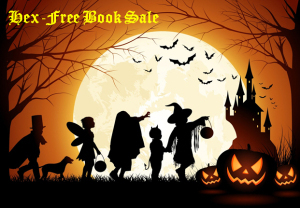 Sale dates: 10/28/16 through 10/31/16
Sale dates: 10/28/16 through 10/31/16
Free Books: Waking Plain, Dream of Crows, At Sea, Willing Spirits
The Stories:
Waking Plain is a story about a sleeping prince who is so plain nobody wants to kiss him and wake him up. Bummer.
Dream of Crows is a story about a poor slob who’s being led into an early grave. Warning: it just might be you.
At Sea is a novel about a conscientious objector serving on an aircraft carrier during the Vietnam War. As it turns out, friends and family are more dangerous than the Viet Cong.
Willing Spirits is a story about a girl who waited to the last minute to do her book report and asks the dead author for help. You know before you start reading that this can’t be good.
Warranty: In spite of modern technology no reputable author can guarantee that his or her books are 100% hex free. We do our best to keep hidden hexes and subliminal messages out of our books. But a small percentage of you might fall under a spell that will cause you to buy more of our books and/or steal your children’s Halloween candy.


October 23, 2016
Those beautiful, sometimes risque and sometimes racist orange crate labels
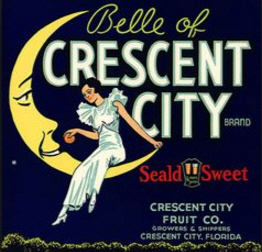
A long-time favorite of mine. Seald Sweet was Florida’s answer to California’s “Sunkist.”
If you visited a farmer’s market or walked into a grocery story stockroom in Florida up through the 1950s, you’d find oranges, grapefruits, and kumquats stacked in wood crates with colorful labels on each end. As kids, we used leftover orange crates for storing all kinds of things until they suddenly disappeared in favor of boring cardboard boxes. While the use of orange crate label art began in California in the 1880s, the practice soon moved to Florida which still has a near-monopoly on U. S. citrus production.
If you Google “orange crate labels” or “vintage orange crate labels,” you’ll quickly find many of the major labels. If you stop by Florida Southern College in Lakeland, you can look at the digitized collection of labels at the Florida Citrus Hall of Fame. (Many of these can be viewed on line.) Labels, and related post card advertising, are almost always for sale on eBay
While the artists were popular names at the time, their work on the ends of those utilitarian crates was seldom signed. For one thing, its purpose was identifying a grower or a shipper to grocery store chains and distributors, not the general public.
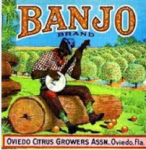 In his 2015 review of Florida’s First Billboards: Florida Citrus Crate Labels, Kevin Bouffard wrote, “A new book stands for the proposition that Florida citrus crate labels played as much a role in the development of the state and its signature agricultural industry as Anita Bryant, beaches and Walt Disney.” No doubt, the book’s limited printing meant that most copies ended up with those who collect and/or sell orange crate labels. Two earlier books are long out of print and hard to find.
In his 2015 review of Florida’s First Billboards: Florida Citrus Crate Labels, Kevin Bouffard wrote, “A new book stands for the proposition that Florida citrus crate labels played as much a role in the development of the state and its signature agricultural industry as Anita Bryant, beaches and Walt Disney.” No doubt, the book’s limited printing meant that most copies ended up with those who collect and/or sell orange crate labels. Two earlier books are long out of print and hard to find.
When my wife and I set up a general store shelf exhibit for a Georgia museum, we enjoyed purchasing old orange crate labels as well as the labels used on canned goods to add to the ambiance and realism of our displays. The “Belle of Crescent City” was one of the labels we chose.
 I mention a few of the racially pejorative labels in Eulalie and Washerwoman when my conjure woman protagonist borrows some crates from the local general store. She was quick to notice the “Southern charm” of labels featuring happy African Americans–many of whom were forced to pick the oranges just as others were forced to work in turpentine camps–as though they were in change of the orange groves and personally selected the oranges in the crates. Labels from Indian River featured Indians, some in skimpy dress. Others featured women in bathing suits or were purposefully racy.
I mention a few of the racially pejorative labels in Eulalie and Washerwoman when my conjure woman protagonist borrows some crates from the local general store. She was quick to notice the “Southern charm” of labels featuring happy African Americans–many of whom were forced to pick the oranges just as others were forced to work in turpentine camps–as though they were in change of the orange groves and personally selected the oranges in the crates. Labels from Indian River featured Indians, some in skimpy dress. Others featured women in bathing suits or were purposefully racy.
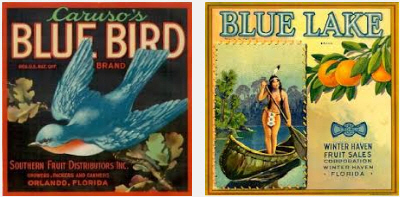
When we used orange crates for hauling and storing things, we noticed the labels, but never made an attempt to salvage them. Now I wish we had. We might make a few dollars on eBay or donate them to the Citrus Hall of Fame for its collection. Even the sexist and racist labels are part of our history, something we hope never to repeat, but generally speaking, most of the labels are advertising works of art. I’m sorry to see them gone.
–Malcolm
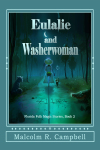 Malcolm R. Campbell is the author of the 1950s-era novel
Eulalie and Washerwoman
, a story of kidnapped men, stolen houses, and a conjure woman’s magic.
Malcolm R. Campbell is the author of the 1950s-era novel
Eulalie and Washerwoman
, a story of kidnapped men, stolen houses, and a conjure woman’s magic.
Visit his website here.


October 19, 2016
Getting comfortable in your writing shoes
Comfortable doesn’t mean complacent. If you hike or climb mountains, you know that new shoes often hurt and need to be broken in before a major trek. The wrong kind of shoes and the wrong size shoes are often worse because the shoes have to match what you’re doing. The same thing is true of writers, figuratively speaking, because while genres and styles have a lot of things in common, each requires an approach you need to be comfortable with.
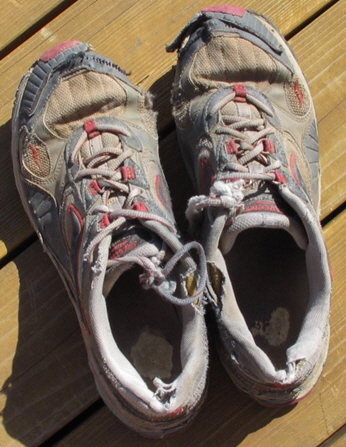 Depending on which survey you look at, romance, action/adventure, science fiction and fantasy usually sell the most books. Unfortunately, some of the sub-genres in those groupings aren’t carried on the coattails of the most popular books.
Depending on which survey you look at, romance, action/adventure, science fiction and fantasy usually sell the most books. Unfortunately, some of the sub-genres in those groupings aren’t carried on the coattails of the most popular books.
For me, that means magical realism–which is what I write–is down at the 2% or 3% range of sales. Obviously, the the size of a writer’s audience will skew the figures for individual books, though J. K. Rowling discovered that as Snape said to Harry Potter, “fame isn’t everything” affects authors asd well as wizards. (Her fans hated “A Casual Vacancy.)
For me, “comfortable writing shoes” work best with magical realism. They work as poorly for other genres as wearing flip flops or high heels in the world series. To some extent, finding comfortable shoes is part of the journey to being comfortable with oneself. I’ve always wished I could be fluent in multiple language, play a Bach toccata and fugue on a massive pipe organ, water ski all the way across the bay and back without falling off, and knowing how to repair my own cars. After many years of discord about these things, I had to accept that they weren’t me.
I love writing and reading magical realism, but that doesn’t mean I haven’t wished I could turn out a great romance or spy novel from time to time to support my magical realism habit. But I can’t do it even though I have enjoyed many spy and FBI-related novels over the years just as I’ve enjoyed a lot of recordings of Bach over the years. But liking something doesn’t always translate into being good at it–though, it’s a nice start.
The hints and signs about our authentic selves are available for us to see early on, but we either don’t recognize them or actively deny them. Growing up, I spent most of my time out doors or reading about magic. These interests are closely linked in most magical realism. I learned more from nature than I did from school, especially my literature and other English classes. I was a fish out of water in those classes because the approach to writing and the great classics of the written word seemed counterproductive and false to me. I was the worst student in English classes and the most likely to openly defy the teachers.
I had one wonderful writing teacher. He didn’t give us theories, he asked us to write, and then we talked about what worked. This is how most of us learn most of what we know. We try things out. We experiment. Some things fail either because we don’t really like them or aren’t skillful in those areas or are just incompatible with them. Other things work. Finding out why they work is a Nirvana-like experience. You want to shout YES!!!!!!!!!!!!. Learning in this teacher’s class was about the only worthwhile course I had in my English minor in college. In that class, we focused on pure storytelling rather than on an approach better suited to a doctoral dissertation in literary or communications theory.
Like many others, I spent time trying to fit in because when you’re the only one in the class who disagrees with the teacher’s approach, it’s hard not to cave in to the pressure of the rest of the students and the system itself.
Now that I’m not in school–or teaching in one–I don’t have to answer to those who support the system. I can write what I want to write and wear the kinds of shoes and attitudes that fit my chosen genre. I’m comfortable with this now, though I certainly wasn’t comfortable with it in high school and college because I was a rebel when it came to the course syllabus and (as they call them) the expected “learning outcomes.”
I guess it comes down to the fact that I’d rather be happy than rich and I’d rather be comfortable as myself and as a writer than being part of the crowd making the scene at popular parties, bars like the fictional “Cheers,” or being the guy all the girls want to dance with. Life would have been so much easier if I’d figured all this out 40 years ago. So would my writing.
If you’re a writer, you probably know what you love to write even if nobody wants to buy it or Oprah doesn’t call or MGM doesn’t option your novels for movies. If you love writing fiction that catches on with huge numbers of readers, then that’s a mixed blessing. Financially, you’ll be secure, but as Snape said, “fame isn’t everything.” Fame tends to get in a person’s way and keep them from wearing their most comfortable shoes.
–Malcolm
 Malcolm R. Campbell is the author of the recently released novel “Eulalie and Washerwoman,” a folk magic story set in the Florida Panhandle in the 1950s.
Malcolm R. Campbell is the author of the recently released novel “Eulalie and Washerwoman,” a folk magic story set in the Florida Panhandle in the 1950s.
Speaking of shoes, Campbell still wears the climbing boots he bought in the 1960s even though his knees really complain if he tries to climb anything higher than an ant hill.





